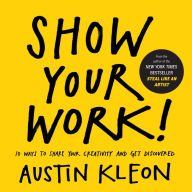19. Show Your Work - Austin Kleon (📱)
27 May 2017
Rating 9/10
Reading Notes:
“Give what you have. To someone, it may be better than you dare to think.” —Henry Wadsworth Longfellow
“That’s all any of us are: amateurs. We don’t live long enough to be anything else.” —Charlie Chaplin
We’re all terrified of being revealed as amateurs, but in fact, today it is the amateur—the enthusiast who pursues her work in the spirit of love.
“Remembering that I’ll be dead soon is the most important tool I’ve ever encountered to help me make the big choices in life. Because almost everything—all external expectations, all pride, all fear of embarrassment or failure—these things just fall away in the face of death, leaving only what is truly important. Remembering that you are going to die is the best way I know to avoid the trap of thinking you have something to lose. You are already naked.” —Steve Jobs
“In order for connection to happen, we have to allow ourselves to be seen—really seen.” —Brené Brown
Facebook asks you to indulge yourself, with questions like “How are you feeling?” or “What’s on your mind?” Twitter’s is hardly better: “What’s happening?” I like the tagline at dribbble.com: “What are you working on?” Stick to that question and you’ll be good. Don’t show your lunch or your latte; show your work.
Human beings want to know where things came from, how they were made, and who made them. The stories you tell about the work you do have a huge effect on how people feel and what they understand about your work, and how people feel and what they understand about your work effects how they value it.
If you want to be more effective when sharing yourself and your work, you need to become a better storyteller. You need to know what a good story is and how to tell one.
The most important part of a story is its structure. A good story structure is tidy, sturdy, and logical.
You should be able to explain your work to a kindergartner, a senior citizen, and everybody in between.
author George Orwell wrote: “Autobiography is only to be trusted when it reveals something disgraceful.”
We all like to think we’re more complex than a two-sentence explanation, but a two-sentence explanation is usually what the world wants from us.
“Whatever we say, we’re always talking about ourselves.” —Alison Bechdel
“The impulse to keep to yourself what you have learned is not only shameful, it is destructive. Anything you do not give freely and abundantly becomes lost to you. You open your safe and find ashes.” —Annie Dillard
Author Christopher Hitchens said that the great thing about putting out a book is that “it brings you into contact with people whose opinions you should have canvassed before you ever pressed pen to paper. They write to you. They telephone you. They come to your bookstore events and give you things to read that you should have read already.”
“When people realize they’re being listened to, they tell you things.” —Richard Ford
“What you want is to follow and be followed by human beings who care about issues you care about. This thing we make together. This thing is about hearts and minds, not eyeballs.” —Jeffrey Zeldman
“Have you tried making yourself a more interesting person?” This seems like a really mean thing to say, unless you think of the word interesting the way writer Lawrence Weschler does: For him, to be “interest-ing” is to be curious and attentive, and to practice “the continual projection of interest.” To put it more simply: If you want to be interesting, you have to be interested.
If, after hanging out with someone you feel worn out and depleted, that person is a vampire. If, after hanging out with someone you still feel full of energy, that person is not a vampire.
Relax and breathe. The trouble with imaginative people is that we’re good at picturing the worst that could happen to us. Fear is often just the imagination taking a wrong turn.
Balance. You have to remember that your work is something you do, not who you are. This is especially hard for artists to accept, as so much of what they do is personal. Keep close to your family, friends, and the people who love you for you, not just the work.
“The trick is not caring what EVERYBODY thinks of you and just caring about what the RIGHT people think of you.” —Brian Michael Bendis
The first step in evaluating feedback is sizing up who it came from. You want feedback from people who care about you and what you do. Be extra wary of feedback from anybody who falls outside of that circle.
“Above all, recognize that if you have had success, you have also had luck—and with luck comes obligation. You owe a debt, and not just to your gods. You owe a debt to the unlucky.” —Michael Lewis
“The minute you stop wanting something you get it.” —Andy Warhol
“Anyone who isn’t embarrassed of who they were last year probably isn’t learning enough,” writes author Alain de Botton.